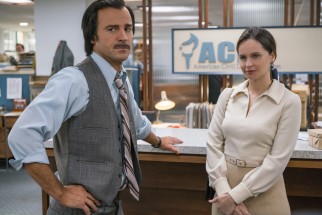On the Basis of Sex Movie Review
 |
On the Basis of Sex
Theatrical Release: December 25, 2018 / Running Time: 120 Minutes / Rating: PG-13 Director: Mimi Leder / Writer: Daniel Stiepleman Cast: Felicity Jones (Ruth Bader Ginsburg), Armie Hammer (Martin Ginsburg), Justin Theroux (Mel Wulf), Sam Waterston (Erwin Griswold), Kathy Bates (Dorothy Kenyon), Cailee Spaeny (Jane Ginsburg), Jack Reynor (Jim Bozarth), Stephen Root (Professor Brown), Chris Mulkey (Charles Moritz), Gary Werntz (Judge Doyle), Francis Xavier McCarthy (Judge Daughterty), Ben Carlson (Judge Holloway), Ronald Guttman (Gerald Gunther), Wendy Crewson (Harriet Griswold), John Ralston (Tom Miller) |
One of this year's best-attended and most beloved documentaries, RBG celebrated the life and career of Supreme Court Justice Ruth Bader Ginsburg. Now, mere months after that film's formidable run ended, we get a Hollywood biopic of Ginsburg.
On the Basis of Sex, whose blush-inducing title seems entirely at odds with its primary demographic, focuses on Ginsburg's fight against gender discrimination. We open in 1956, Ginsburg's time at Harvard is complicated by a cancer scare experienced by her strapping, supportive husband Martin (Armie Hammer), himself a student one year ahead of her. After he beats the odds, the couple and their young daughter move to New York for Martin's job in tax law, prompting Ruth to transfer to Columbia Law School. Upon graduating, no firm will hire Ruth as a lawyer, so she settles for teaching the law, especially in relation to gender studies, to the increasingly woke next generation.
In the early 1970s, Ruth finds the case she hopes can be the springboard for eliminating all kinds of unconstitutional laws that discriminate, ahem, on the basis of sex. It involves an aging lifelong bachelor (Chris Mulkey) who has been denied a tax deduction for caregiving expenses for his sick mother because he is an unmarried male. It seems an unlikely entry point to try to topple sexist laws that have existed and been accepted for hundreds of years, but Ruth devotes herself to it, with her husband and the American Civil Liberties Union both pitching in to help the cause.
The pitch by industry outsider and first-time screenwriter Daniel Stiepleman couldn't have been much more than four words "Ruth Bader Ginsburg biopic." After nearly two decades in television, director Mimi Leder (Deep Impact, Pay It Forward) returns to the big screen here. It seems most appropriate that a woman would be the one to tell Ginsburg's story. Unfortunately, Leder takes a very standard, by-the-numbers approach to the material. The depictions of Ginsburg's marriage, family, and professional obstacles all feel like they're being written by someone who's watched a number of serviceable biopics. The film improves some by its end when it has one specific case to focus on and Jones gets a big courtroom monologue that is both inevitable and the first moment that truly resonates in a dramatic way.
Apart from that climax, On the Basis remains merely watchable, giving you some recent history and perspective on women's rights movements without much grace or subtlety. Ginsburg's daughter Jane grows up to be a teenager (Cailee Spaeny) even more woke than her mother and has to lecture Mom to maternal delight and quite possibly your own silent groans. Kathy Bates and Justin Theroux seize opportunities to inject a little welcome personality to the proceedings, chewing up scenes as pioneering lawyer Dorothy Kenyon and flamboyant ACLU legal director Mel Wulf, respectively. The opposing side, that dastardly privilege-protecting patriarchy, is represented by a couple of good ole Harvard boys (Waterston and Stephen Root) and a young lawyer (Jack Reynor) you suspect will be prominent in the inevitable Blu-ray and DVD deleted scenes section.
On the Basis of Sex would seem to be a timely project, based on both the real Ginsburg's iconic status and the enduring fact that women remain marginalized creatively in the film industry. But timeliness cannot compensate for the pedestrian, suprisingly unmoving presentation.
|
Related Reviews:
DVDizzy.com | DVD and Blu-ray Reviews | New and Upcoming DVD & Blu-ray Schedule | Upcoming Cover Art | Search This Site
DVDizzy.com Top Stories:
Now in Theaters: Mary Poppins Returns • Mary Queen of Scots • Vice • A Private War Can You Ever Forgive Me? • Welcome to Marwen
Felicity Jones: The Theory of Everything • Rogue One: A Star Wars Story • Like Crazy • Inferno • A Monster Calls
Armie Hammer: Call Me By Your Name • The Birth of a Nation • The Man from U.N.C.L.E. • The Lone Ranger
Hidden Figures • The Help • Made in Dagenham • Our Brand Is Crisis
Text copyright 2018 DVDizzy.com. Images copyright 2018 Focus Features and Participant Media.
Unauthorized reproduction prohibited.


